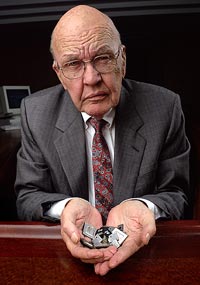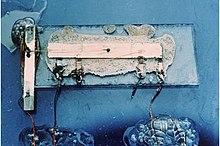| Jack Kilby | |
|---|---|
 | |
| Born | (1923-11-08)November 8, 1923 Jefferson City, Missouri, U.S. |
| Died | June 20, 2005(2005-06-20) (aged 81) Dallas, Texas, U.S. |
| Alma mater | University of Illinois Urbana-Champaign University of Wisconsin–Madison |
| Awards | National Medal of Science (1969) IEEE Medal of Honor (1986) Charles Stark Draper Prize (1989) Computer Pioneer Award (1993) Kyoto Prize (1993) Harold Pender Award (2000) |
| Scientific career | |
| Fields | Physics, electrical engineering |
| Institutions | Texas Instruments |
Jack St. Clair Kilby (8 November 1923 - 20 June 2005) was an American electrical engineer who took part, along with Robert Noyce of Fairchild Semiconductor, in the realization of the first integrated circuit while working at Texas Instruments (TI) in 1958. He was awarded the Nobel Prize in Physics on 10 December 2000.
Kilby was also the co-inventor of the handheld calculator and the thermal printer, for which he had the patents. He also had patents for seven other inventions.
Early life
Jack Kilby was born in 1923 in Jefferson City, Missouri, to Hubert and Vina Freitag Kilby. Both parents had Bachelor of Science degrees from the University of Illinois. His father was a manager at a local utility company. Kilby grew up and attended school in Great Bend, Kansas, graduating from the Great Bend High School. Today road signs at the entrances to the town commemorate his time there, and the Commons Area at Great Bend High School has been named The Jack Kilby Commons Area.
Kilby received his Bachelor of Science degree from the University of Illinois Urbana-Champaign, where he was an honorary member of Acacia Fraternity. In 1947, he received a degree in electrical engineering. He earned his Master of Science in electrical engineering from the University of Wisconsin-Extension in Milwaukee.
Career
Kilby was vital to the invention of the integrated circuit. In mid-1958, as a newly employed engineer at Texas Instruments (TI), he did not yet have the right to a summer vacation. Kilby spent the summer working on the problem in circuit design that was commonly called the "tyranny of numbers", and he finally came to the conclusion that the manufacturing of circuit components en masse in a single piece of semiconductor material could provide a solution. On September 12, he presented his findings to company's management, which included Mark Shepherd. He showed them a piece of germanium with an oscilloscope attached, pressed a switch, and the oscilloscope showed a continuous sine wave, proving that his integrated circuit worked, and thus that he had solved the problem. U.S. Patent 3,138,743 for "Miniaturized Electronic Circuits", the first integrated circuit, was filed on February 6, 1959. It was notable for having different components (transistors, diodes, resistors, capacitors, etc.) on one single substrate. Along with Robert Noyce (who independently made a similar circuit a few months later), Kilby is generally credited as co-inventor of the integrated circuit.
Jack Kilby went on to pioneer military, industrial, and commercial applications of microchip technology. He headed teams that created the first military system and the first computer incorporating integrated circuits. He invented the handheld calculator (along with Jerry Merryman and James Van Tassel).
In 1970, he took a leave of absence from TI to work as an independent inventor. He explored, among other subjects, the use of silicon technology for generating electrical power from sunlight. From 1978 to 1984, he held the position of Distinguished Professor of Electrical Engineering at Texas A&M University.
In 1983, Kilby retired from Texas Instruments.
Legacy

He died of cancer June 20, 2005, at the age of 81, in Dallas, Texas.
On December 14, 2005, Texas Instruments created the Historic TI Archives. The Jack Kilby family donated his personal manuscripts and his personal photograph collection to Southern Methodist University (SMU). The collection will be cataloged and stored at DeGolyer Library, SMU.
In 2008, the SMU School of Engineering, with the DeGolyer Library and the Library of Congress, hosted a year-long celebration of the 50th anniversary of the birth of the digital age with Kilby's Nobel Prize-winning invention of the integrated circuit. Symposia and exhibits examined the many ways in which technology and engineers shaped the modern world. Kilby held an honorary doctorate of science from SMU and was a longtime associate of SMU through the Kilby Foundation.
Awards and honors
A statue of Jack Kilby stands in Texas Instruments Plaza on the campus of The University of Texas at Dallas.
Recognition of Kilby's outstanding achievements have been made by the Institute of Electrical and Electronics Engineers (IEEE), including the election to IEEE Fellow in 1966, the IEEE David Sarnoff Award in 1966, co-recipient of the first IEEE Cledo Brunetti Award in 1978, the IEEE Centennial Medal in 1984 and the IEEE Medal of Honor in 1986. He was co-recipient of the Franklin Institute’s Stuart Ballantine Medal in 1966. In 1982 and 1989, he received the Holley Medal from the American Society of Mechanical Engineers (ASME). He was elected to member of the National Academy of Engineering (NAE) in 1967 and received the Academy's Vladimir K. Zworykin Award in 1975. Kilby received the Golden Plate Award of the American Academy of Achievement in 1970 and was co-recipient of the first NAE's Charles Stark Draper Prize in 1989. The Kilby Award Foundation was founded in 1980 in his honor, and the IEEE Jack S. Kilby Signal Processing Medal was created in 1995. He was elected to the American Philosophical Society in 2001.
Kilby was awarded the Stibitz-Wilson Award from the American Computer & Robotics Museum in 1997.
Kilby is also the recipient of the America's most prestigious honors in science and engineering: the National Medal of Science in 1969, and the National Medal of Technology in 1990. In 1982, he was inducted into the National Inventors Hall of Fame.
In 1993, he was awarded the Kyoto Prize by the Inamori Foundation. He was awarded both the Washington Award, administered by the Western Society of Engineers and the Eta Kappa Nu Vladimir Karapetoff Award in 1999. In 2000, Kilby was awarded the Nobel Prize in Physics for his breakthrough discovery, and delivered his personal view of the industry and its history in his acceptance speech.
Kilby was awarded nine honorary doctorate degrees from universities including Southern Methodist University, the University of Miami, University of Illinois, University of Wisconsin–Madison, Texas A&M University, Yale and Rochester Institute of Technology. The National Chiao Tung University (NCTU) in Taiwan awarded Kilby with a certificate of Honorary Professorship in 1998.
The Kilby Labs, TI's research laboratory for silicon manufacturing and integrated circuit design, is named after him.
The Jack Kilby Computer Centre at the Merchiston Campus of Edinburgh Napier University in Edinburgh is also named in his honor.
See also
References
- ^ Harper, Charles A., ed. (2004). Electronic materials and processes handbook. McGraw-Hill handbooks (3 ed.). McGraw-Hill. ISBN 9780071402149.
- The Nobel Prize in Physics 2000
- "The Chip that Jack Built". IT Invention. Retrieved 27 May 2014.
- Das, Saswato R. (2008-09-19). "Opinion: The chip that changed the world". The New York Times.
- "The Nobel Prize in Physics 2000". Nobel Foundation. Retrieved 2011-07-14.
- Stengle, Jamie (7 March 2019). "Jerry Merryman, co-inventor of handheld electronic calculator, dies at 86". The Washington Post. Retrieved 8 March 2019.
- John Markoff (June 22, 2005). "Jack S. Kilby, an Inventor of the Microchip, Is Dead at 81". New York Times. Retrieved 9 January 2022.
- "What's the Story? The TI Plaza Statue".
- "IEEE David Sarnoff Award Recipients" (PDF). IEEE. Archived from the original (PDF) on June 19, 2010. Retrieved December 6, 2011.
- "IEEE Cledo Brunetti Award Recipients" (PDF). IEEE. Retrieved December 6, 2011.
- "IEEE Medal of Honor Recipients" (PDF). IEEE. Archived from the original (PDF) on 2015-04-22. Retrieved December 6, 2011.
- "Franklin Laureate Database – Stuart Ballantine Medal 1966 Laureates". Franklin Institute. Archived from the original on 2012-12-10. Retrieved December 6, 2011.
- "Holley Medal". American Society of Mechanical Engineers. Retrieved December 6, 2011.
- "NAE Members Directory – Mr. Jack S. Kilby". National Academy of Engineering. Retrieved December 6, 2011.
- "Golden Plate Awardees of the American Academy of Achievement". www.achievement.org. American Academy of Achievement.
- "Recipients of The Charles Stark Draper Prize". National Academy of Engineering. Retrieved December 6, 2011.
- "APS Member History". search.amphilsoc.org. Retrieved 2021-10-19.
- "Stibitz-Wilson Awards 1997".
- Nobel Prize acceptance speech
- "School of Computing – Facilities & Resources". Edinburgh Napier University. Retrieved July 24, 2012.
References bibliography
- Berlin, Leslie The man behind the microchip: Robert Noyce and the invention of Silicon Valley Publisher Oxford University Press US, 2005 ISBN 0-19-516343-5
- Lécuyer, Christophe. Making Silicon Valley: Innovation and the Growth of High Tech, 1930-1970 Published by MIT Press, 2006.ISBN 0262122812
- Nobel lectures, World Scientific Publishing Co., Singapore, 2000.
External links
 Media related to Jack Kilby at Wikimedia Commons
Media related to Jack Kilby at Wikimedia Commons
- "Jack St. Clair Kilby: A Man of Few Words", biography by Ed Millis.
- "From concept to cosmos: How Jack Kilby's integrated circuit transformed the electronics industry", biography by Texas Instruments.
- "Jack Kilby, Touching Lives on Micro and Macro Scales" by T.R. Reid, The Washington Post (June 2005).
- Jack S. Kilby Patents
- "Tribute to Jack Kilby", Dream 2047, November 2005
| 2000 Nobel Prize laureates | |
|---|---|
| Chemistry |
|
| Literature (2000) |
|
| Peace |
|
| Physics |
|
| Physiology or Medicine |
|
| Economic Sciences |
|
| IEEE Medal of Honor | |
|---|---|
| 1976–2000 |
|
- 1923 births
- 2005 deaths
- Engineers from Missouri
- Engineers from Texas
- American inventors
- People from Jefferson City, Missouri
- Physicists from Missouri
- Scientists from Missouri
- Grainger College of Engineering alumni
- University of Wisconsin–Madison College of Engineering alumni
- American electronics engineers
- Nobel laureates in Physics
- American Nobel laureates
- IEEE Medal of Honor recipients
- National Medal of Technology recipients
- National Medal of Science laureates
- Texas Instruments people
- Deaths from cancer in Texas
- Amateur radio people
- Draper Prize winners
- Scientists from Kansas
- IEEE Centennial Medal laureates
- Fellows of the IEEE
- Members of the United States National Academy of Engineering
- Kyoto laureates in Advanced Technology
- Members of the American Philosophical Society
- Acacia members
